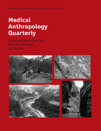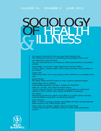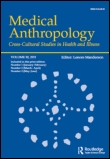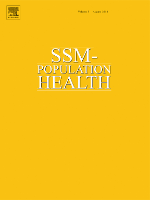
MEDICAL ANTHROPOLOGY QUARTERLY
Scope & Guideline
Illuminating the Complexities of Health and Society
Introduction
Aims and Scopes
- Cultural Perspectives on Health and Illness:
The journal emphasizes the importance of understanding health and illness within cultural contexts, exploring how cultural beliefs, practices, and narratives influence health outcomes and medical practices. - Global Health Issues and Policies:
Research published in the journal often addresses global health challenges, examining the implications of health policies, interventions, and practices across different sociocultural settings. - Social Determinants of Health:
A core focus is on the social determinants that affect health, such as socioeconomic status, race, gender, and geography, highlighting how these factors contribute to health disparities. - Ethnographic Methodologies:
The journal promotes the use of ethnographic methods to gain deep insights into health practices and beliefs, allowing for nuanced understandings of health-related phenomena. - Interdisciplinary Approaches to Medical Anthropology:
Medical Anthropology Quarterly encourages interdisciplinary research, integrating perspectives from public health, sociology, and political science to enrich the understanding of health issues.
Trending and Emerging
- Technology and Global Health:
There is a growing focus on the role of technology in health, including digital health interventions and surveillance systems, addressing both their benefits and ethical concerns. - Mental Health and Well-being:
Recent articles emphasize mental health issues, particularly in the context of societal stresses such as the COVID-19 pandemic, showcasing an increasing recognition of mental health as a critical component of overall health. - Reproductive Health and Justice:
Emerging themes around reproductive health, including access to abortion and reproductive technologies, reflect ongoing societal debates and the need for justice in reproductive rights. - Climate Change and Health:
Research is increasingly linking climate change to health outcomes, exploring how environmental factors impact health and well-being, particularly in vulnerable communities. - Intersectionality in Health Disparities:
There is a trend towards examining health disparities through an intersectional lens, considering how overlapping identities and social categories affect health outcomes.
Declining or Waning
- Traditional Biomedical Perspectives:
There is a noticeable decline in papers that strictly adhere to traditional biomedical models, as the journal increasingly prioritizes holistic and culturally informed approaches to health. - Historical Analyses of Medical Practices:
Research focusing exclusively on historical accounts of medical practices seems to be waning, with more emphasis placed on contemporary issues and their immediate social implications. - Purely Quantitative Studies:
The journal appears to be moving away from purely quantitative studies that lack ethnographic depth, favoring qualitative research that captures complex human experiences related to health. - Individualistic Health Narratives:
Papers centered on individualistic, rather than collective or community-based health narratives, are less frequently published, indicating a shift towards understanding health in broader social contexts.
Similar Journals

SOCIOLOGY OF HEALTH & ILLNESS
Connecting Health Discourse with Societal ImpactSociology of Health & Illness is a leading academic journal published by Wiley, dedicated to exploring the intricate relationships between health, illness, and society. With an ISSN of 0141-9889 and an e-ISSN of 1467-9566, this journal has established a significant presence since its inception in 1979, continuing to provide valuable insights through to 2024. Recognized in the Q1 quartile across multiple categories, including Health Policy, Health (Social Science), and Public Health, Environmental and Occupational Health, it ranks impressively at 52nd in Social Sciences and holds a robust reputation with a Scopus classification that places it within the top percentiles of its field. The journal’s objectives focus on publishing high-quality research that advances understanding of the social determinants of health and their implications, making it indispensable for scholars, professionals, and students committed to health-related research. Operating from its headquarters in the United Kingdom, **Sociology of Health & Illness** contributes significantly to the global discourse on health and social welfare, reinforcing its vital role in shaping knowledge and policy in health and social sciences.

Anthropologie et Sante-Revue Internationale Francophone d Anthropologie de la Sante
Illuminating the Intersection of Culture and CareAnthropologie et Santé - Revue Internationale Francophone d'Anthropologie de la Santé is a pioneering platform in the field of medical anthropology, published by ASSOC AMADES, that has been at the forefront of research since its inception. With an ISSN of 2111-5028, this journal has maintained an Open Access model since 2010, ensuring that knowledge is disseminated freely to a global audience. Based in Aix-en-Provence, France, it offers a unique perspective on the intersections of culture, health, and society, catering specifically to researchers, professionals, and students interested in understanding the anthropological dimensions of health and healthcare practices across diverse populations. Although specific metrics like H-Index and Scopus ranks are currently unavailable, the journal's commitment to rigorous peer-review and its emphasis on multilingual contributions significantly enrich its academic relevance. By fostering interdisciplinary dialogue and showcasing innovative research, Anthropologie et Santé plays a critical role in shaping contemporary discussions around health anthropology and its global implications.

CULTURE MEDICINE AND PSYCHIATRY
Connecting Cultures, Health, and Psychiatric PracticesCULTURE MEDICINE AND PSYCHIATRY is a distinguished interdisciplinary journal published by SPRINGER, dedicated to examining the intricate relationships between culture, health, and psychiatry. With an ISSN of 0165-005X and an E-ISSN of 1573-076X, the journal has established a significant presence in the academic community, showcasing impactful research since its inception in 1977. It is recognized for its excellence, currently ranked in the Q1 category in Anthropology and Arts and Humanities, and achieving Q2 rankings in Health (social science) and Medicine (miscellaneous) as of 2023. The journal provides a vital platform for scholars to explore the social determinants of health, the influence of cultural practices on mental well-being, and the role of psychiatry across diverse contexts. Although it is not an open-access journal, researchers, professionals, and students can access a wealth of knowledge and groundbreaking studies that push the boundaries of understanding in these critical fields. CULTURE MEDICINE AND PSYCHIATRY is an essential academic resource for those keen on enhancing their insight into the dynamic interplay between culture and mental health.

Puerto Rico Health Sciences Journal
Transforming Health Practices through Research ExcellenceThe Puerto Rico Health Sciences Journal, ISSN 0738-0658 and E-ISSN 2373-6011, is an esteemed publication hosted by the University of Puerto Rico Medical Sciences Campus. Established in 1985, this journal serves as a vital platform for disseminating research in the field of health sciences, particularly in a Caribbean context. Despite its current categorization in Q4 of the Medicine (miscellaneous) domain, the journal is dedicated to fostering scientific discussion and collaboration among researchers, healthcare professionals, and students. It is ranked #424 out of 636 in Scopus under General Medicine, reflecting its emerging influence in the medical research community with a 33rd percentile. The journal publishes original research, reviews, and case studies, providing an essential resource for advancing medical knowledge and improving healthcare practices. The commitment to open access resources is in consideration, promoting accessibility to high-quality research. For more than three decades, the Puerto Rico Health Sciences Journal has been at the forefront of health-related investigations in Puerto Rico, aiming to contribute substantially to both local and global health discussions.

Journal of Bioethical Inquiry
Illuminating Ethical Pathways in Health and SocietyThe Journal of Bioethical Inquiry, published by Springer, is a prominent academic journal in the fields of bioethics, health policy, and social sciences. Established in 2004 and running through 2024, it is recognized for providing a critical platform for the exploration of ethical issues arising in the contexts of healthcare and policy making. With an ISSN of 1176-7529 and an E-ISSN of 1872-4353, this esteemed journal holds a Q2 quartile ranking in both Health Policy and Health (Social Science) categories, indicating its significant impact and contributions to the field. It boasts impressive Scopus rankings, with a standing of #70 out of 371 in Social Sciences _ Health (Social Science) and #68 out of 310 in Medicine _ Health Policy, representing its relevance and authority in these domains. Although it does not currently offer open access options, the Journal of Bioethical Inquiry remains a vital resource for researchers, practitioners, and students eager to engage with the complexities of bioethical challenges and to advance the discourse on health policies.

JOURNAL OF THE HISTORY OF MEDICINE AND ALLIED SCIENCES
Connecting Historical Insights with Contemporary HealthJOURNAL OF THE HISTORY OF MEDICINE AND ALLIED SCIENCES is a prestigious academic journal published by Oxford University Press, focusing on the interdisciplinary study of the historical evolution of medicine and its related fields. Since its inception in 1946, this journal has been at the forefront of disseminating scholarly research that bridges history and contemporary medical practices. With an impressive Q1 ranking in History and a dedicated readership comprised of researchers, professionals, and students, it serves as a vital resource to enhance understanding of the historical contexts that shape modern healthcare. Although categorized in Q4 in Geriatrics and Gerontology, the journal's contributions are invaluable for fostering discussions on the development and implications of medical practices over time. The journal does not offer Open Access options, maintaining a traditional subscription model to support high-quality peer-reviewed research. Its commitment to advancing the field is reflected in its prominent position within the Scopus rankings, making it an essential platform for those engaged in the intersection of history and medicine.

Medical Anthropology
Investigating the Complexities of Health and CultureMedical Anthropology is a premier journal dedicated to exploring the intersections of health, culture, and society through an anthropological lens. Established in 1977 and published by Routledge Journals, Taylor & Francis Ltd, this influential journal serves as a vital platform for researchers and practitioners to disseminate groundbreaking studies that address contemporary health issues. With an impressive Impact Factor and recognized as Q1 in Anthropology and Q2 in Health (social science) for 2023, it is well-regarded within the academic community, illustrated by its Scopus Ranks placing it in the top percentile of its fields. Although it does not currently offer open access options, the journal remains an essential resource for those looking to deepen their understanding of medical practices, societal health disparities, and the cultural underpinnings of health behaviors. Publishing regular issues through 2024, Medical Anthropology continues to shape the discourse in the fields of anthropology and health sciences, making it a must-read for students, researchers, and professionals committed to innovation and impact in health-related research.

Anthropology & Medicine
Innovating the Dialogue Between Anthropology and Medicine.Anthropology & Medicine, published by Routledge Journals, Taylor & Francis Ltd, represents a vital intersection of social sciences and health research, providing a platform for innovative scholarship in the field of anthropology and its implications for medicine. With an esteemed 2023 Scopus ranking placing it in the top tiers of anthropology and arts and humanities, this journal fosters critical dialogue between anthropological insights and medical practice, addressing pressing health issues through ethnographic lenses. The journal’s scope includes the exploration of cultural practices, health inequalities, and the social determinants of health, making it essential reading for researchers, professionals, and students dedicated to understanding the complexities of human health in diverse contexts. Although not an open access publication, its rigorous academic standards and impactful research contributions underscore its importance within both anthropology and medical fields, as reflected in its impressive category quartiles and its convergence from 1997 to 2024. Engaging with this journal positions scholars at the forefront of discussions shaping the future of healthcare and anthropology.

Korean Journal of Medical History
Fostering Open Dialogue in the History of MedicineThe Korean Journal of Medical History is a distinguished publication in the field of medical history, focusing on the interplay between medicine and cultural, social, and philosophical contexts within Korea and beyond. Published by the Korean Society for the History of Medicine, this journal has been an open-access platform since 1992, fostering accessibility for researchers and practitioners alike. With its ISSN 1225-505X, the journal seeks to contribute to a deeper understanding of the historical developments in medicine, offering valuable insights for scholars and students interested in the evolution of medical practices. The journal is categorized in Q4 in both the History and Philosophy of Science and Medicine (miscellaneous) as of 2023, placing it at a nascent yet significant position within the academic landscape. Although it currently holds modest Scopus ranks, the journal is pivotal for those exploring the historical narrative of medicine in South Korea. Researchers and students are encouraged to engage with the journal, contributing to its expanding archive of knowledge while enriching their own academic pursuits. Addressed from Yonsei University College of Medicine in Seoul, the journal's commitment to openness and scholarly communication plays a critical role in advancing the field of medical history.

SSM-Population Health
Exploring the forefront of public health challenges.SSM-Population Health, published by ELSEVIER SCI LTD, stands as a prestigious platform dedicated to advancing our understanding of population health dynamics. As an Open Access journal since 2015, it fosters a culture of knowledge sharing, allowing researchers, professionals, and students to access high-quality research without barriers. With exceptional rankings in the 2023 category quartiles—Q1 in Health Policy, Health (social science), and Public Health, Environmental and Occupational Health—the journal emphasizes its influential role in shaping public health discourse and policy. Its notable Scopus rankings place it in the top deciles of various health-related fields, underlining its impact on contemporary health issues and research. SSM-Population Health invites contributors to address pressing questions and solutions within the realm of population health, making it a vital resource for those aiming to make an impact in this ever-evolving field.